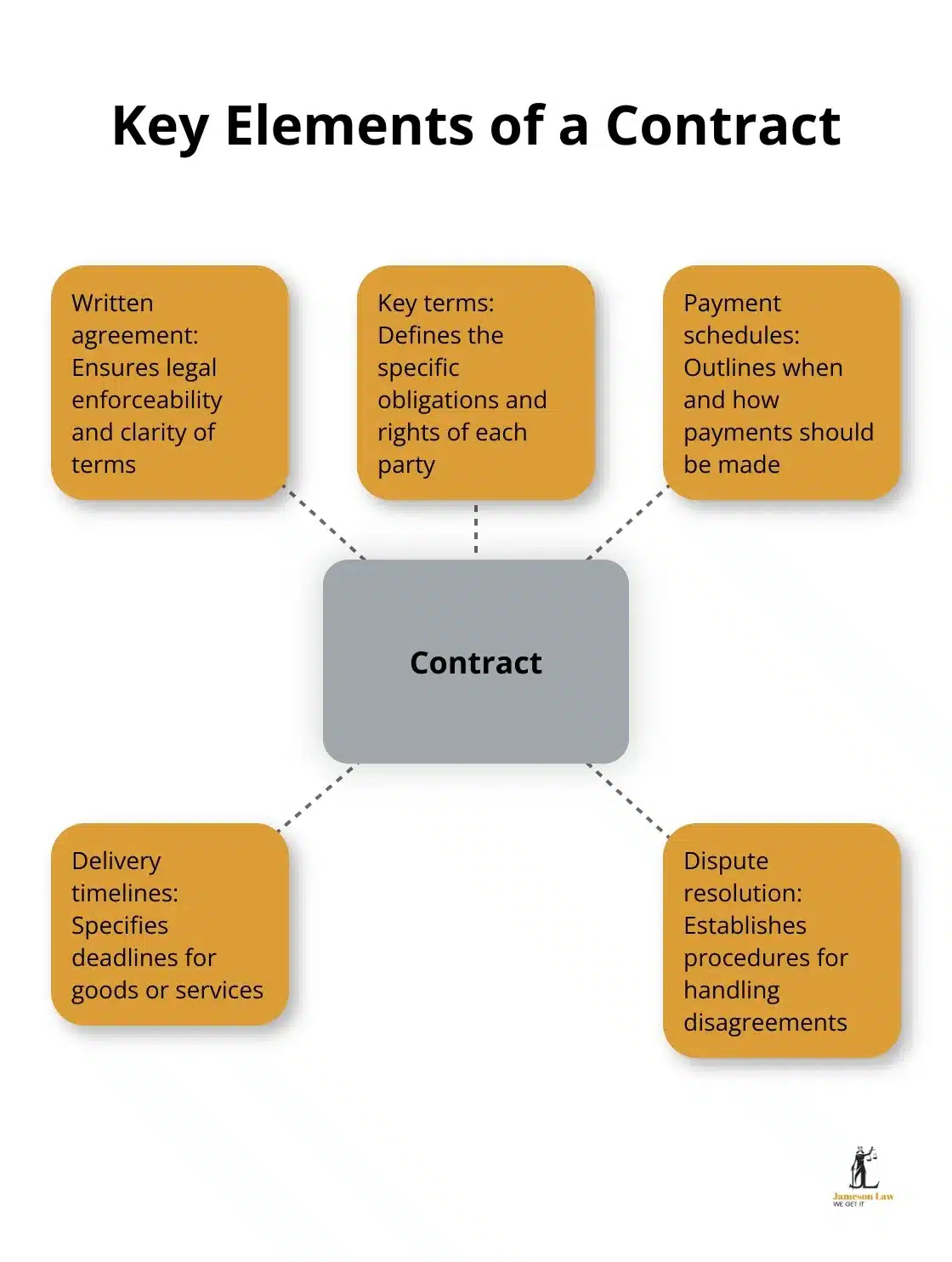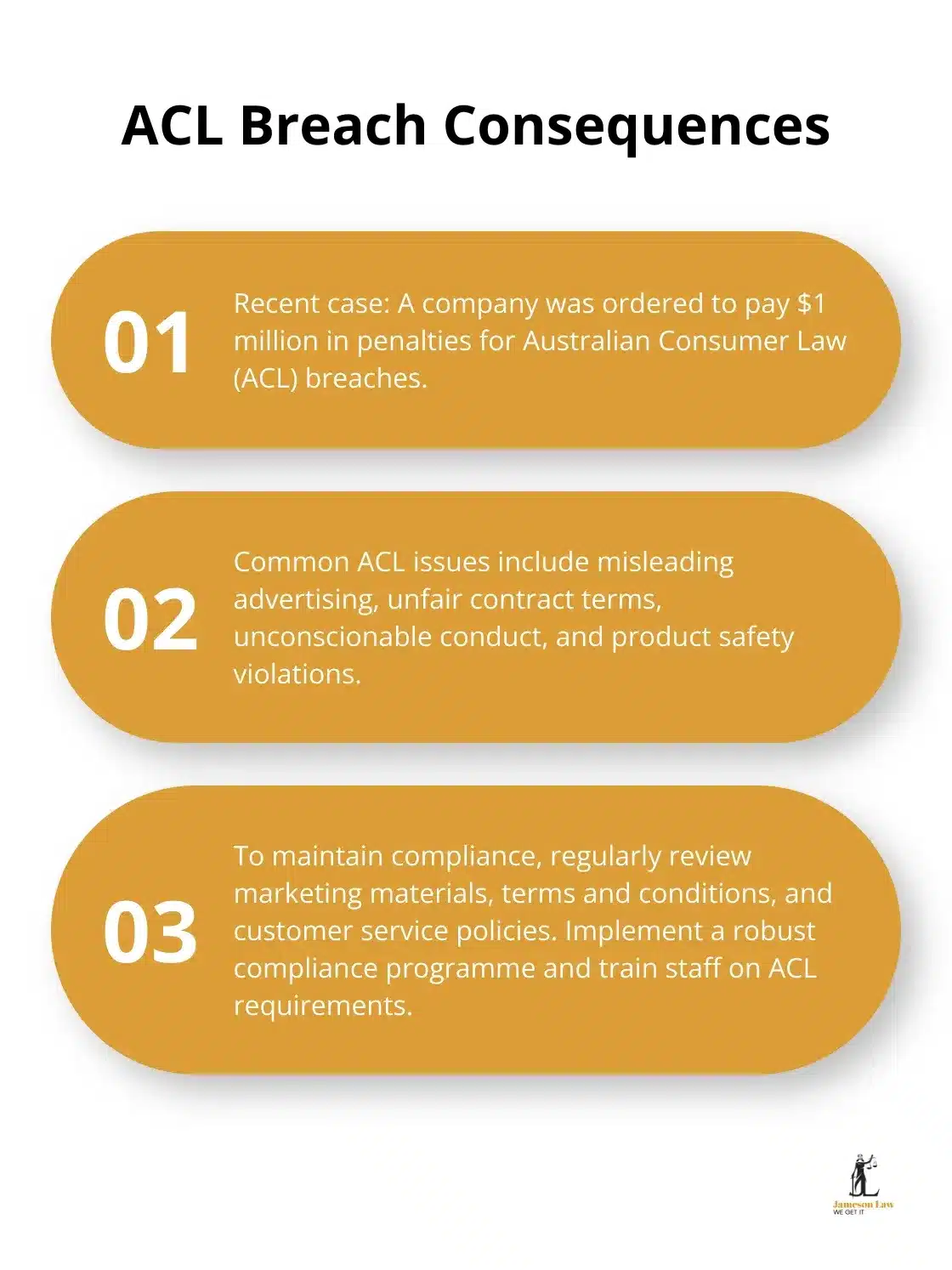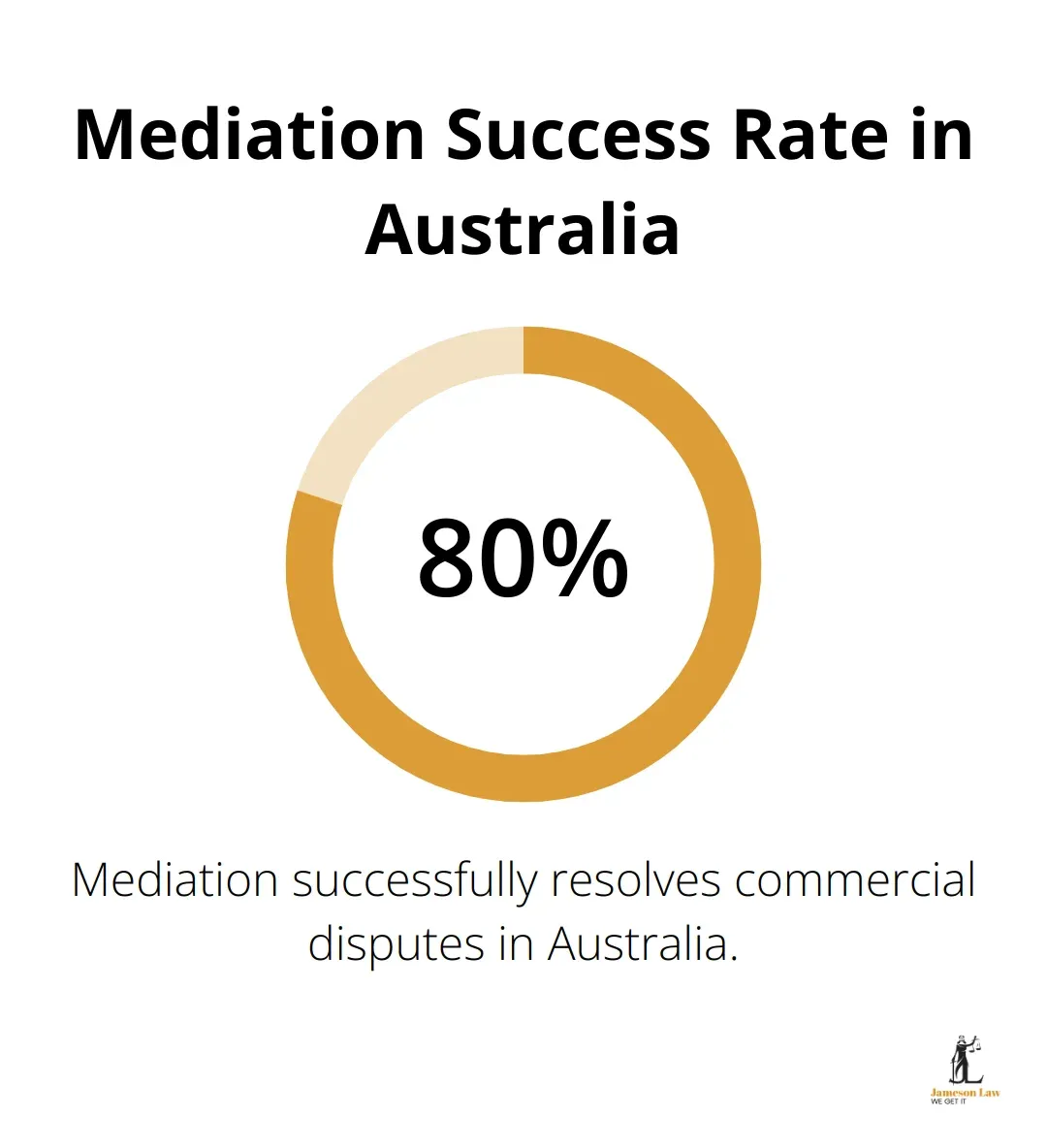Commercial law in Australia is a complex and ever-evolving field that impacts businesses of all sizes. From contract negotiations to intellectual property protection, understanding the legal landscape is essential for success in the Australian market.
At Jameson Law, we’ve seen firsthand how proper legal guidance can make or break a company’s future. This guide explores key areas of commercial law, common legal issues, and effective dispute resolution strategies for Australian businesses, with a practical focus for Sydney and NSW operators.
Key Areas of Commercial Law in Australia
Commercial law in Australia encompasses several critical areas that businesses must navigate to operate successfully. Four key areas frequently impact businesses: contract law, corporate law, intellectual property rights, and consumer protection laws. For authoritative background, see business.gov.au and ASIC.
Contract Law: The Foundation of Business Agreements
Contract law forms the backbone of commercial transactions in Australia. A well-drafted contract protects business interests and helps prevent costly disputes. Many businesses underestimate the importance of clear, comprehensive agreements.
A recent example involved a small business owner who relied on a handshake deal with a supplier. When the supplier failed to deliver, the client had limited legal recourse due to the absence of a written agreement. This situation could have been avoided with a proper contract in place that included price, delivery, quality standards, and a dispute pathway such as mediation.
To safeguard your business, you should:
![]() Put all significant agreements in writing (even short-form statements of work). Consider e-signing tools that meet the Electronic Transactions Act.
Put all significant agreements in writing (even short-form statements of work). Consider e-signing tools that meet the Electronic Transactions Act.
![]() Include key terms: payment schedules, delivery timelines, warranties, liability caps, IP ownership, and dispute resolution procedures (see Federal Court ADR practice note).
Include key terms: payment schedules, delivery timelines, warranties, liability caps, IP ownership, and dispute resolution procedures (see Federal Court ADR practice note).
![]() Have a commercial lawyer review important contracts before signing, especially where standard-form terms may be “unfair” under the ACL.
Have a commercial lawyer review important contracts before signing, especially where standard-form terms may be “unfair” under the ACL.

Useful templates and checklists for small business are available from the Australian Small Business and Family Enterprise Ombudsman.
Corporate Law: Choosing the Right Business Structure
Corporate law governs how businesses form and operate in Australia. Selecting the appropriate business structure is important for tax purposes, liability protection, and future growth.
The most common structures in Australia are:
![]() Sole trader
Sole trader
![]() Partnership
Partnership
![]() Company (Pty Ltd)
Company (Pty Ltd)
![]() Trust
Trust
Each has pros and cons. For example, a company provides limited liability but has higher compliance and reporting obligations with ASIC filings and taxation managed with the ATO. Many startups begin as sole traders for simplicity, then shift to a company to protect personal assets and facilitate investment. Review structure as you scale and consider director duties under the Corporations Act 2001.
Intellectual Property: Protecting Your Business Assets
Intellectual property rights are often overlooked by small businesses, yet they may be your most valuable assets. In Australia, IP can include copyright, trade marks, patents, registered designs, confidential information, and domain names.
A striking example is a local tech startup that nearly lost its innovative software to a competitor because it hadn’t secured protection. By filing a provisional patent and registering its trade mark with IP Australia, the company secured its position and avoided brand confusion.
To protect your IP:
![]() Audit your intangibles (logos, names, content, code, product designs, trade secrets).
Audit your intangibles (logos, names, content, code, product designs, trade secrets).
![]() Register key trade marks/patents/designs early—registration is generally first-in, best-dressed.
Register key trade marks/patents/designs early—registration is generally first-in, best-dressed.
![]() Use NDAs and clear ownership clauses in contractor agreements (see business.gov.au IP guide).
Use NDAs and clear ownership clauses in contractor agreements (see business.gov.au IP guide).
Consumer Protection: Complying with Australian Consumer Law
The Australian Consumer Law (ACL) sets out consumer rights and business obligations. Compliance is not optional—breaches can lead to significant penalties and reputational harm. Guidance is available from the ACCC and NSW Fair Trading.
Key ACL areas include:
![]() Prohibitions on misleading or deceptive conduct
Prohibitions on misleading or deceptive conduct
![]() Unfair contract terms (especially in standard-form small business and consumer contracts)
Unfair contract terms (especially in standard-form small business and consumer contracts)
![]() Consumer guarantees (quality, fitness for purpose, repairs/refunds)
Consumer guarantees (quality, fitness for purpose, repairs/refunds)
![]() Unsolicited supplies and agreements
Unsolicited supplies and agreements
To stay compliant, review marketing materials and pricing displays (component pricing rules), refresh terms and policies, and train staff regularly. The ACCC’s small business guide is a helpful reference.
Understanding these key areas is essential for any business operating in Australia. While the rules can be complex, proactive compliance and sound legal advice from a Sydney commercial lawyer can reduce risk and position your business for growth.
What Legal Issues Do Australian Businesses Face?
Australian businesses encounter various legal challenges that can significantly impact operations and cash flow. Below are common hurdles and practical responses.
Contract Disputes: A Common Pitfall
Disputes often arise from unclear drafting, misunderstandings about obligations, or non-performance. The ACL also touches many contract issues—including unfair terms, refunds, and misleading conduct.
To reduce the risk of disputes:
![]() Use precise language and define key terms (delivery, acceptance, service levels).
Use precise language and define key terms (delivery, acceptance, service levels).
![]() Include performance metrics, milestones, and deadlines.
Include performance metrics, milestones, and deadlines.
![]() Add a tiered dispute pathway (good-faith negotiations → mediation → arbitration/court). See Australian Disputes Centre.
Add a tiered dispute pathway (good-faith negotiations → mediation → arbitration/court). See Australian Disputes Centre.
![]() Have a lawyer review high-value or long-term agreements.
Have a lawyer review high-value or long-term agreements.
Unfair Business Practices: Navigating the ACL
Unfair practices can lead to severe penalties. The ACCC regularly publishes enforcement outcomes—a useful barometer of risk areas.
Common issues include:
![]() Misleading advertising and drip pricing
Misleading advertising and drip pricing
![]() Unfair contract terms in standard-form agreements
Unfair contract terms in standard-form agreements
![]() Unconscionable conduct
Unconscionable conduct
![]() Product safety breaches (see Product Safety Australia)
Product safety breaches (see Product Safety Australia)

Maintain compliance by implementing an internal compliance program, running staff training, and scheduling periodic legal reviews. Consider aligning with relevant Australian Standards where applicable.
Employment Law: A Minefield for the Unprepared
Employment breaches can trigger litigation and reputational harm. Common issues include wage underpayments, unfair dismissal, harassment, and misclassification.
To protect your business:
![]() Keep award rates and entitlements current via the Fair Work Ombudsman.
Keep award rates and entitlements current via the Fair Work Ombudsman.
![]() Implement clear policies (bullying, discrimination, leave, remote work) and provide regular training.
Implement clear policies (bullying, discrimination, leave, remote work) and provide regular training.
![]() Manage safety obligations under WHS laws (see Safe Work Australia or SafeWork NSW).
Manage safety obligations under WHS laws (see Safe Work Australia or SafeWork NSW).
![]() Seek advice before terminations or restructures to reduce risk.
Seek advice before terminations or restructures to reduce risk.
Regulatory Compliance: Keeping Up with Changing Laws
Regulatory change is constant. Key concerns include privacy, environmental rules, WHS, and sector-specific licences.
![]() Privacy & data protection—follow guidance from the OAIC and be mindful of the Notifiable Data Breaches scheme.
Privacy & data protection—follow guidance from the OAIC and be mindful of the Notifiable Data Breaches scheme.
![]() Environmental obligations—check your state EPA and reporting thresholds.
Environmental obligations—check your state EPA and reporting thresholds.
![]() Industry licences/permits—confirm via ABLIS (Australian Business Licence and Information Service).
Industry licences/permits—confirm via ABLIS (Australian Business Licence and Information Service).
Appoint a compliance lead, keep registers for licences and key policies, and diarise review dates.
How to Resolve Commercial Disputes in Australia
Mediation: A Cost-Effective First Step
Mediation is often the quickest, most cost-effective pathway. Australian services such as the Australian Disputes Centre and Australian Mediation Association provide accredited mediators.
Mediation benefits include:
![]() Lower costs than litigation
Lower costs than litigation
![]() Faster outcomes (days or weeks, not months)
Faster outcomes (days or weeks, not months)
![]() Confidentiality and relationship preservation
Confidentiality and relationship preservation
![]() Greater control over the solution
Greater control over the solution

Prepare by collecting all relevant documents, assessing best/worst alternatives, and setting a realistic settlement range.
Arbitration: When You Need a Binding Decision
Arbitration is more formal than mediation and results in a binding award. It’s common in construction, resources, and cross-border contracts. Institutions such as ACICA (Australian Centre for International Commercial Arbitration) administer proceedings and provide model clauses.
Advantages include:
![]() A final, enforceable decision (with limited appeal rights)
A final, enforceable decision (with limited appeal rights)
![]() Confidentiality and avoidance of open court
Confidentiality and avoidance of open court
![]() Ability to appoint an arbitrator with industry expertise
Ability to appoint an arbitrator with industry expertise
Litigation: The Final Option
Litigation may be necessary for urgent relief (e.g., injunctions), complex matters, or where other methods fail. Guidance on commercial proceedings is available from the Federal Court and your state Supreme Court.
If you head to court:
![]() Gather contemporaneous evidence (emails, purchase orders, delivery dockets, finance records).
Gather contemporaneous evidence (emails, purchase orders, delivery dockets, finance records).
![]() Prepare for a longer process—many matters run for months or more.
Prepare for a longer process—many matters run for months or more.
![]() Weigh costs and prospects—negotiate in parallel, as most cases settle before judgment.
Weigh costs and prospects—negotiate in parallel, as most cases settle before judgment.
The Importance of Legal Representation
Skilled legal representation is vital, regardless of the pathway. A commercial lawyer can assess prospects, negotiate strategically, and protect your interests through mediation, arbitration, or court.
Final Thoughts
Commercial law in Australia shapes the business landscape. Understanding contracts, structures, IP, and consumer protection empowers decision-making and reduces risk. Address issues early—compliance programs, documented processes, and strong contracts save time and money.
Professional legal advice is invaluable in navigating the complexities of commercial law. Our Sydney team assists with contract drafting and reviews, dispute resolution, and regulatory compliance (privacy, WHS, ACL, and sector licences). We provide practical solutions to protect your commercial interests and support growth across NSW and Australia.
If you’re ready to reduce legal risk and strengthen your contracts and compliance, book a consultation with Jameson Law today.













